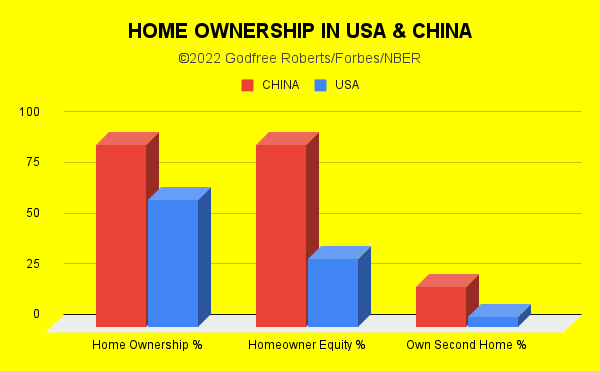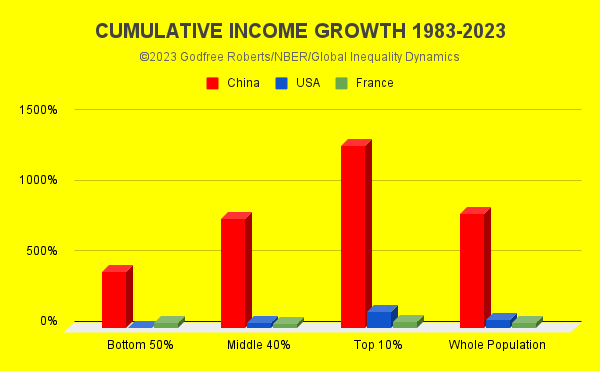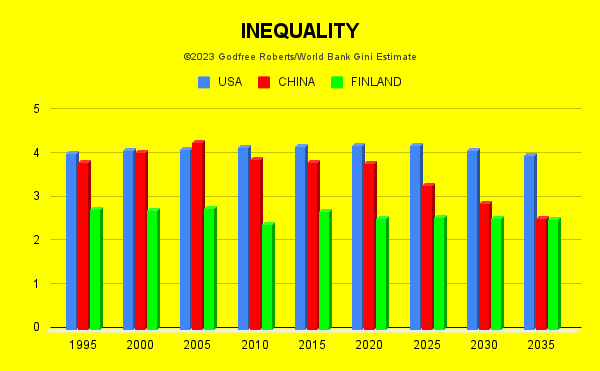經濟狀況使得男人沒有足夠的錢來照顧年邁的父母和贍養他們的妻子和孩子。即使在好的年份,他們的生活也是痛苦的,而在糟糕的年份,他們卻在努力避免饑餓和死亡。在這種情況下,你怎麽能指望他們是文明的——更不用說合法了?The economy is in such a state that men don’t have enough money to care for elderly parents and support their wives and children. Even in good years their lives are bitter while, in bad years, they struggle to avoid starvation and death. Under such circumstances, how can you expect them to be civil – let alone lawful?孟子,公元前 320 年。 Mencius, 320 BC.
貧困的概念化並不是理所當然的事情。對於高村村民來說,2017年貧困的定義是無法建造符合現行標準的房子,也無法讓家裏的兒子或兒子們成家立業。中國或許仍然是一個發展中國家,但食物和住所等日常必需品已不再是大多數人,甚至是高村最貧困人口的唯一生活目標和目的。The conceptualization of poverty is not something that can be taken for granted. For Gao villagers, in 2017 poverty is defined by the inability to build a house that is up to the current standard, and to get the family’s son or sons properly married. China may still be a developing country, but daily necessities such as food and shelter are no longer the only aims and purpose of life for most people, even the poorest in Gao Village. 重訪高村Gao Village Revisited,, 莫波高。2018.Mobo Gao. 2018.
在一開始的時候In the beginning
1850年,當西方壟斷了世界財富時,其資本家將信貸、土地和勞動力私有化,並通過操縱他們創造的市場經濟使人類社會服從於他們的意願。In 1850, when the West monopolized the world’s wealth, its capitalists privatized credit, land and labor and subordinated human society to their wishes by manipulating the market economy they had thus created.
1950年,中國這個地球上最貧窮的國家,將信貸、土地和勞動力置於公益之上,創建了有機經濟來服務社會。In 1950, China, the poorest nation on earth, subordinated credit, land, and labor to public welfare and created an organic economy to serve society.
貧困與不平等Poverty & Inequality
如今,中國的重點是減少不平等,但簡要回顧一下消除貧困的方式可以了解新運動的背景。Today, China is focused on reducing inequality, but a brief recap of how poverty was eliminated contextualizes the new campaign.
1993年,上海成功的最低生活保障試點推向全國,成為今天的In 1993, Shanghai’s successful Minimum Livelihood Guarantee Trial Spot went national, becoming today’s 底保,它dībǎo,根據當地生活費用支付人們實際收入與“低保線”之間的差額,並給予領取者可自由支配的資金和醫療保險等福利。 which pays the difference between people’s actual income and the ‘dībǎo line,’ based on local living costs and gives recipients discretionary money and access to benefits like medical insurance.
2000年,聯合國製定了六項千年發展目標:到2015年消除極端貧困、饑餓、疾病、住房不足、排斥和教育中的性別偏見。中國接受了這一挑戰,從那時起,在扶貧日,國家主席和總理部長在電視工作人員的陪同下走訪偏遠村莊,提醒城市居民貧困是什麽樣子。In 2000, the UN set six Millennium Development Goals: eliminate extreme poverty, hunger, disease, inadequate shelter, exclusion, and gender bias in education by 2015. China took up the challenge and ever since, on Poverty Relief Day, the President and Prime Minister, trailed by TV crews, visit remote villages to remind urbanites what poverty looks like.
2008年,電視上出現的一個苗族家庭擁有一間小土坯房,靠種地、賣血、打零工維持生計。他們帶著三個孩子(少數民族不受計劃生育限製),買不起家具,所以他們的衣服都疊在地板上,他們的娛樂就是一台黑白電視。當地政府每月給她們兩百塊錢的生活費,丈夫偶爾打工掙十到二十塊錢,賣血又賺了一百塊錢。他的妻子說,這筆錢支付了六十磅大米、兩包鹽、一公斤辣椒和一袋洗衣粉、電費和交通費。村長解釋說:“我們村有1770人,有兩百多人靠賣血為生。我們的土地幹旱,in 2008, an ethnic Miao family featured on TV owned a little adobe house, farmed their tiny plot, sold blood, and did odd jobs to get by. With three children (minorities are exempt from family planning), they were unable to afford furniture so their clothes were folded on the floor and their entertainment was a black-and-white TV. They received a monthly living allowance of two hundred dollars from the local government, the husband’s occasional day jobs earned ten to twenty dollars, and blood-selling brought in another hundred dollars. His wife said this paid for sixty pounds of rice, two packs of salt, a kilo of peppers and a bag of washing powder, electricity and transportation. Their village headman explained, “Our village population is 1,770 and more than two hundred people live on blood-selling. Our land is arid, seven hundred villagers’ homes have no arable land at all and, without a road, they walk three miles for drinking water”.
2009年,農村養老金將貧困率降低到14%,2014年,工傷補償、生育津貼、失業保險、技能培訓和城鎮就業平等機會將貧困率降低到7%。In 2009, rural pensions lowered poverty to fourteen percent then, in 2014, workers’ compensation, maternity benefits, unemployment insurance, skills training and equal access to urban employment reduced it to seven percent.
到2016年,城市貧困已經消失,到2021年6月1日,幾乎所有處於收入分配下半部分的中國人都擁有了一套免費且幹淨的住房。By 2016, urban poverty had disappeared and by June 1, 2021, almost every Chinese in the lower half of the income distribution owned a home free and clear.
2018年,數以萬計的扶貧隊伍走進貧困村,幫助他們加入現金經濟,種植蘑菇、種植梨樹、飼養馬海毛山羊或接待生態遊客——任何能讓他們進入現金經濟的方式。In 2018, tens of thousands of anti-poverty teams moved into poor villages to help them join the cash economy by growing mushrooms, planting pear trees, raising mohair goats, or hosting eco-tourists–anything to bring them into the cash economy.
每戶貧困戶的門上都貼著一張壓膜紙,上麵列出了貧困戶的情況、致貧原因、整治方案、完成日期以及負責人的姓名、照片和電話號碼。企業紛紛介入。蘋果公司的組裝商富士康將二十萬個工作崗位遷往內陸,惠普將大型工廠遷至新疆,北京則將整所大學遷往內陸。但真正扭轉局麵的是基礎設施——公路、鐵路、互聯網和無人機。Pinned to the door of every poor household was a laminated sheet listing its occupants, the causes of their poverty, their remediation program, a completion date and the name, photograph and phone number of the responsible official. Corporations pitched in. Foxconn, Apple’s assembler, moved two-hundred thousand jobs inland, Hewlett-Packard moved huge factories to Xinjiang, and Beijing moved entire universities. But it was infrastructure–roads, railways, Internet and drones–that tipped the scales.
到2019年,高速、低成本的互聯網服務改變了12.3萬個貧困村莊的生活,使電子商務、遠程教育、遠程醫療和公共服務的提供成為可能。隨著農作物噴灑、土地測量和產品交付使非農就業成為農村收入的大部分,偏僻的村莊很快平均每天有四次無人機接送,對無人機駕駛課程的需求激增。By 2019, lives in one-hundred twenty-three thousand poor villages had been transformed by high-speed, low-cost Internet service that made e-commerce, distance education, remote healthcare and delivery of public services possible. Isolated villages soon averaged four daily drone pickups and demand for drone piloting classes exploded as crop-spraying, land surveying, and product delivery made off-farm employment the majority of rural income.
為了消除孤立,國會從汽車銷售稅收入中支出了 1200 億美元,修建了 15 萬英裏的鄉村道路,其中一條通往馬樹坪,這是黃河沿岸的一個偏僻的懸崖村莊,也是陝西省最貧困的村莊之一。村民種植蘋果和花椒樹,但被迫將農產品廉價賣給少數騎摩托車來的經銷商。然後,一條新的五百英裏河岸高速公路帶來了“有針對性的扶貧隊伍”,一位種植者說,“我們的蘋果還掛在樹上就賣完了”。到2019年,人均收入是全國貧困線的兩倍。To combat isolation, Congress spent $120 billion from vehicle sales tax revenues building 150,000 miles of rural roads, one of which reached Mashuping, an isolated cliff village on the bank of the Yellow River and one of the poorest in Shaanxi Province. Villagers cultivated apples and Sichuan pepper trees but were forced to sell their produce cheaply to the few dealers who came by motorbike. Then a new five-hundred mile, riverbank highway brought ‘targeted anti-poverty teams’ and, said a grower, “Our apples sell out while they’re still hanging on the trees”. By 2019, per capita income was twice the national poverty level.
像習近平長大的梁家河這樣的村莊,利用了獨特的利基市場。盡管唯一的道路兩旁仍然是白菜地,但精明的居民吸引了遊客,向數千名遊客收取每人 8 美元的費用,讓他們聆聽習近平的“四苦”——跳蚤叮咬、糟糕的食物、艱苦的勞動和融入農民的故事。他們讓三百名過夜的客人在洞穴旅館裏體驗了習近平的童年時光,這些旅館裝飾著老式的毛澤東海報和煤油燈,並配有用土爐取暖的硬磚床。“當然,都是正宗的。我們要保護梁家河的品牌形象。”一位年輕的導遊爽朗地解釋道。Villages like Liangjiahe, where Xi Jinping grew up, exploit unique niches. Though cabbage fields still line its single road, its canny inhabitants cultivate tourists, charging thousands of visitors $8 each to hear tales of Xi’s Four Hardships–flea bites, bad food, hard labour, and assimilating into the peasantry. They give three hundred overnight guests a taste of Xi’s boyhood in cave inns decorated with vintage Mao posters and kerosene lanterns and furnished with hard brick beds warmed by earth stoves. “All authentic, of course. We want to protect the Liangjiahe brand image,” a young guide brightly explains.
專用軟件應用程序幫助農村勞動力找到就業機會,幫助退伍軍人和殘疾人找到計件工作,幫助年輕人返鄉創業。在浙江省的一個試點中,500個村莊雇傭了20萬名當地人,在電子商務領域推廣當地產品和技能,這些村莊在集鎮周圍組織成集群。Dedicated software apps help rural laborers connect with employment opportunities, veterans and disabled folk find piecework, and young people returning home start businesses. In one Zhejiang Trial Spot, five hundred villages employ 200,000 locals to promote local products and skills in e-commerce niches where villages have organized into clusters around market towns.
到2019年,農村網店雇傭了3000萬人,創造了一個比歐洲還大的電子商務市場。By 2019, rural online stores employed thirty-million people, creating an e-commerce market bigger than Europe’s.
當百分之九十的村民以書麵形式宣誓自己不再貧困,並在巡回審計小組進行跟蹤研究並將視頻報告發送給扶貧官員之後,北京就判斷扶貧項目取得了成功。Beijing judged anti-poverty programs successful when ninety percent of villagers swear, in writing, that they are no longer poor, and after roaming teams of auditors conduct followup studies and send their video reports to anti-poverty officers.
投資回報率ROI
北京計劃到2040年收回全部扶貧投資,主要通過電子銷售稅。加速的內陸增長引發了沿海勞動力短缺,迫使雇主實現自動化、提高生產率並向價值鏈上遊移動——正如北京方麵所希望的那樣。如今,根據生產力、法規和福利進行調整後,中國雇員給雇主帶來的成本高於美國雇員,但他們中隻有 2% 繳納稅款。Beijing plans to recoup its entire poverty alleviation investment by 2040, mostly through e-sales taxes. Accelerating inland growth has triggered coastal labor shortages and forced employers to automate, raise productivity, and move up the value chain–just as Beijing intended. Today, adjusted for productivity, regulations and benefits, Chinese employees cost their employers more than their American cousins, yet barely two percent of them pay taxes.
不等式Inequality
直到最近,數百萬繳納城市養老基金的農民工隻能在自己的家鄉領取全額養老金,而當他們工作結束返回家鄉時,地方政府卻沒有錢給他們。盡管資金匱乏的內陸省份提出請求,富裕的沿海省份仍堅持持有數十億美元的盈餘。Until recently, millions of migrant workers who contributed to urban retirement funds could only collect full pensions in their home provinces, and local governments had no money for them when they returned at the end of their working lives. Despite pleas from cash-starved inland provinces, rich coastal provinces clung to multi-billion surpluses.
因此,北京利用國有企業股票出售所得的資金創建了萬億美元的國民養老保險計劃,並於2011年吸引了實力雄厚的省份加入該計劃。《人民日報》通過訴諸民族自豪感來爭取支持,“在美國這樣的發達國家——基尼指數有時達到0.41——通過逐步增加對富人的稅收和改善福利製度來幫助窮人,收入差距得到了緩解。中國應該學習美國的經驗。”So Beijing created a trillion-dollar National Pension Insurance Program using money from SOE stock sales and, in 2011 and strong-armed provinces to join it. The People’s Daily drummed up support by appealing to national pride, “In developed countries like America – whose Gini index sometimes reaches .41 – income disparities are eased through gradually increasing taxation on the wealthy and improving welfare systems to help the poor. China should learn from America’s experience.”
2014年,公務員和學者在習近平的壓力下加入了國家養老金計劃,2019年,北京發行了10億張電子社會保障卡,可以訪問個人和醫療記錄、發放社會保障福利、接受政府補貼和報銷以及支付賬單。In 2014, civil servants and academics, under pressure from Xi, joined the national pension plan and, in 2019, Beijing issued a billion electronic social security cards that access personal and medical records, dispense social security benefits, receive government subsidies and reimbursements and pay bills.
隨著As 財富wealth再分配成為優先事項,經濟學家發現,不平等統計數據被誇大了,因為內陸的土地、住房和食品要便宜 redistribution becomes a priority, economists are finding that inequality statistics have been exaggerated because land, housing and food are 得多much——盡管護理質量是相同的。農村收入的購買力比同等工資的沿海城市高出百分之五十。 cheaper inland – though quality of care is identical. Rural incomes have fifty percent more purchasing power than the same wages in a coastal city.
當他們對臨時移民進行調整時,不平等進一步縮小。When they adjusted for temporary migration, inequality shrank even further. Until 2019, economists counted people by where their 直到2019年,經濟學家都是根據戶口登記hukou地而不是實際居住地來統計人口,因此三億農民工的流動嚴重扭曲了統計數據。事實上,沿海省份的流動居民比其戶籍人口多了數百萬,而內陸省份的流動居民少了數百萬,因此從內陸移居沿海的工人會提升不平等指標,因為——盡管她仍然被算作生活在農村老家——她為沿海地區的總收入做出了貢獻。 were registered rather than where they actually lived, so the movement of three hundred million migrant workers distorted statistics severely. In reality, the coastal provinces have millions more migrant residents than their registered populations and the inland provinces have millions less, so a worker moving from the interior to the coast lifts inequality indicators because – though she is still counted as living in her rural home – she contributes to aggregate income at her coastal location.
相對論Relativity
當分析師糾正這個錯誤時,他們發現自 1978 年以來,地區不平等每年下降 1.1%。When analysts corrected this error, they found that regional inequality has been falling 1.1% annually since 1978.
2002年,14名貴州工人的收入加起來相當於1名上海人,但到2020年,這個數字已降至5人。結構性差距也不像聽起來那麽痛苦。內陸人和他們的朋友每年都在變得更加富有,對他們來說,上海的奢華生活方式並不比曼哈頓的生活方式對阿拉斯加小石城的人們更重要。In 2002, it took the combined earnings of fourteen Guizhou workers to equal one Shanghainese but, by 2020, the number had dropped to five. Nor is the structural gap as painful as it sounds. Inlanders and their friends get richer every year and, to them, Shanghai’s glitzy lifestyle is no more relevant than Manhattan’s is to folks in Little Rock, AK.
2023年,沿海廣東省的居民比內陸甘肅省的居民富裕四倍,但甘肅人民的生活比亞美尼亞人或烏克蘭人要好,而In 2023, residents of coastal Guangdong Province were four times richer than those in inland Gansu – but Gansu folk were better off than Armenians or Ukrainians – while


